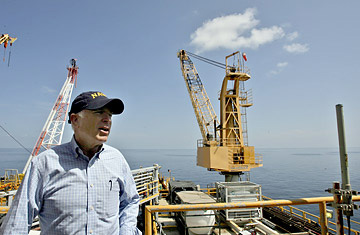
Republican presidential candidate Sen. John McCain tours the Chevron Genesis Oil Rig Platform in the Gulf of Mexico.
John McCain stood atop an oil rig in the Gulf of Mexico on Tuesday and proclaimed that he had the key to solving America's energy woes, slashing the price of gas, and unfettering U.S. foreign policy from its addiction to foreign oil. Drill. Drill here. And drill now. "Americans across our country are hurting because of the cost of energy," said McCain in a speech on the Chevron-owned rig. "It's time for America to get serious about energy independence, and that means we need to start drilling offshore at advanced oil rigs like this."
The oil rig was 100 miles from the Louisiana coast, but if McCain had listened hard, he could have heard environmentalists and Democrats grinding their teeth in opposition. As McCain repeats his drilling mantra, critics point out that there is far too little untapped oil in American waters to make a significant difference in gas prices, especially considering the vast and growing global demand for petrol. Besides, "drilling now," as McCain says, won't yield results for years, and offshore exploration still has serious environmental risks. (That last point was underscored by the timing of McCain's visit — his rig trip was delayed because of a hurricane and oil spill in the Gulf a month ago.) The Democratic National Committee spoofed the Republican candidate's infatuation with drilling by distributing Exxon/McCain '08 bumper stickers to his traveling press corps.
But the energy debate, as its being played out in the Presidential campaign, is far from funny. The reality is that whether the U.S. drills or not, it really doesn't make a difference — not against the sheer scale of the energy and climate crisis facing America and the rest of the world. (Indeed, the other 6.3 billion people factor into this equation too.) The International Energy Agency (IEA) recently estimated that under a business-as-usual scenario — which the U.S. seems intent on abiding — global oil demand would rise 70% by 2050. That increase represents five times as much oil as Saudi Arabia produces annually. You could drill America with exploratory wells until it looked like Swiss cheese and still not make much of a dent in that figure.
That's not to say offshore drilling should be off limits. The world will be on fossil fuels for the foreseeable future, and we will need more oil. If individual U.S. states want to take the risk of opening up their coastlines to drilling, let them — it's not a battle environmentalists should insist on winning.
The larger problem is that the Presidential campaign has been captured by a mostly meaningless debate over offshore drilling, which is obscuring a far more relevant question regarding the energy crisis: how can America develop workable alternative fuels — right here and right now?
Instead of squabbling over the nickels and dimes of offshore oil, we need to create a national plan to capture the future of energy: wind, solar, electric cars, next-generation biofuels. And this should be America's priority even among those who don't believe a word Al Gore has ever said about global warming. If we have any chance of avoiding a future where we feel nostalgic for $4-a-gallon gas, or where countries with lots of oil (Russia, for example) can make a mockery of our foreign policy, we'll need scaled-up alternatives now. Drilling advocates argue that we need to start exploring now so we'll reap the benefits in a decade, but the same goes for development of renewables — we have no time to waste.
It's too bad we seem to be treating alternative energy policy as somewhat less important than, say, passing resolutions to establish National Substitute Teacher Recognition Week (May 5-9). Eight times this year, the Senate has failed to pass legislation that would extend tax credits that encourage the development of the wind and solar industry, legislation that will expire at the end of December. (McCain, it should be noted, missed all eight of those votes — a record that doesn't jibe well with his campaign promises to pursue an aggressive alternative energy program along with offshore drilling.) Without those tax credits, the renewable energy industry "is grinding to a halt," says Peter Duprey, CEO of the North American arm of the Spanish renewable company Acciona Energy, which has a 64-megawatt solar thermal plant operating outside Las Vegas, and recently launched a 180-megawatt wind farm on the border between North Dakota and South Dakota. "Everyone says America is the land of opportunity for renewables," says Duprey. "We have to get serious about it."
Duprey points out that the arguments used by proponents of offshore drilling can also be used to support aggressive investment in alternatives. "We have this vast untapped renewable energy reserves, just like oil and gas," he says, referring to the rich wind resources of the Midwest and the solar potential of the Southwest. "We just need to build the transmission lines to move that energy out." Think of it that way, and suddenly alternatives don't seem like a far-off solution based on science fiction, but a resource that exists today, if it can be tapped — just like offshore oil. That's a job for government, whether it means building the lines directly or using tax credits to support private industry. This is the debate we should be having this election season — not an empty argument over offshore drilling or properly inflated tires.
